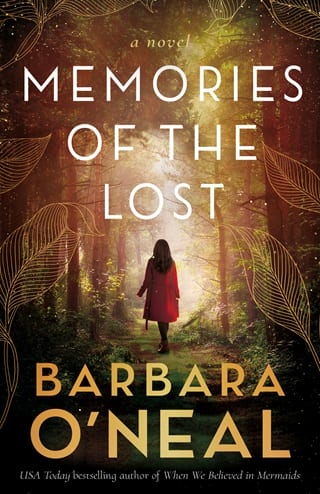CHAPTER EIGHT
Wulfecombe
Sage Evely had learned to find pleasure in ordinary things. It was the thing that had, in the end, made life bearable.
Walking to work every morning was an ordinary thing. She loved her village, particularly on a spring morning when few people were afoot. Her terraced house crouched on the edge of town, and she followed winding streets down modern pavements to cobblestones, past the ford over the river that had been built by the Romans, and then the requisite castle ruin. It hadn't been much of a castle even in its heyday, only a tower keep and a wall that lay in ruins, but it was theirs, and they prized it.
History ran deep here. Wulfecombe had been a market town in the Middle Ages, raided by the Vikings in the Dark Ages, occupied by the Romans. Stone circles littered the fields with evidence of Bronze Age people, and it was possible to find archaeological bits from five thousand years of history. On the coast, fossils from dinosaurs littered the rocky beaches.
This morning, Sage took pleasure in the more-fleeting present-day beauty of flowers lining the gardens along the way—a competition of daffodils and narcissi of all sizes and shapes and incarnations, from standard yellow to white to ruffled white and peach. One border boasted white stars centered with apricot ruffles. It looked for all the world like an art installation of lady parts.
Sage's walk took her to Rosemary's Chocolates—her joy, her pride, the business she'd created and now run for more than six years. She'd learned her art in London and brought it home to her own little village, taking advantage of the tourist trade, visitors who came from many directions to the famed open-air market, or on their way to the coast.
This morning, it was only Sage and a fairly new hire, one who'd shown enough promise that Sage had pulled her from behind the counter to work in the back, making chocolate. Lexie was as skinny as an exclamation mark, her dishwater hair still straw-dry on the lower half, glossier on the new growth. She'd come to the shop through a council program designed to help find stable work for girls with a criminal background—almost always rooted in addiction or poverty and the wretched choices of partners the girls made. Lexie had a three-year-old daughter she desperately wanted to see regularly, and the motivation made her a reliable employee.
It would until it didn't. Sage knew firsthand how easy it was to suddenly find yourself awash in a mess again. She'd been clean for eleven years but didn't take it for granted.
The Wailing Jennies sang on the speakers, and rain tapped against the windows, sometimes admittedly leaking through the cracks in the ancient walls. The building had stood since the Middle Ages, always a place of hospitality, often run by women. An alehouse, a bakery, and various cafés over the centuries. Sometimes the staff feared the cellar below and avoided certain other areas—a dark stairway to the storage rooms overhead, a particular alcove near the alleyway, but she loved to imagine the ghosts were all women like herself, making their way in a world often more than a little hostile.
This morning, Sage and Lexie were working on ganaches to be flavored in various ways, then run through the temperer. She used a mandolin to slice ginger paper thin, ginger her mother grew organically in her greenhouse.
Clare grew carrots, too: purple and yellow, red Indian carrots, common English orange, which she'd promised to bring this morning. Sage would use them for dinner tonight at home, mixing the carrots with heaps of similarly shredded cabbage, red and green, with yellow and red onions, and then roast with olive oil and salt and pepper, a warm salad for a cold spring day. Nourishment for herself and the baby growing within.
"This good, boss?" Lexie asked, offering a pile of finely chopped walnuts, the sizes even and tiny.
"Well done," Sage said. "I'll start the jelly. Get the molds ready."
"Which one again?" Lexie looked at the stacks of molds in dozens of varieties stacked up on a pair of shelves that ran the length of the room. "I keep forgetting."
"That's all right. It takes time." She kept meaning to make a chart of which chocolates went into which molds, but there never seemed to be enough time. Paula had been nagging her to hire an admin assistant, but the truth was, it was hard enough to get and keep even a skeleton staff for the shop. Like everyone in the service industry, she struggled with staffing post-pandemic. It was the constant subject of conversation among small business owners, and it had put more of them out of business than the pandemic by far.
No one could figure out where all the people had gone. How did they live? Where did they live?
It was a mystery, and until it was solved, Sage would continue to hope to hire an administrative assistant to make a chart of the molds for her chocolates. "The round ones with lines on half."
"These?" she held up a pleated version.
"No, one more over. That's right. Make sure they're clean. No water."
"Right. I remember."
Sage poured water over finely chopped ginger and brought it to a simmer, inhaling the scent that mixed with the overt chocolate fragrance in the room. The ginger and walnut chocolates were one of her bestsellers, and she loved the mingling of flavors. She made a mental note to add them to the list of things she needed to be sure were stocked for her maternity leave, which would likely not be a long stretch, but she wanted to make sure this baby was well cared for, too.
A figure appeared at the back door, a tall woman with black hair cut short, wearing jeans and a peasant blouse below her raincoat. Her face showed the hard road she'd traveled, in deep lines along her mouth and around her eyes, eyes that looked older than her fifty-nine years.
"Hey, Mum. Did you bring my carrots?"
She held up a canvas bag with greens sprouting from the top. "Lots. They're very sweet."
Sage waited for what she knew was coming.
"Is she kicking?" Clare asked.
She laughed, turning to offer her belly to her mother, feeling a sweet little twist of love for grandmother and child as Clare's long hands cupped the six-month belly. As if on cue, the child in her belly shifted, pushed a fist toward the gentle voice she must surely be coming to recognize by now. "Hello, love," Clare cooed. "How's my darling girl today?"
Clare's hair had begun to sprout silvery threads, the shimmery strands coarser and wavier than the rest, and it roused in Sage a sense of tenderness. She passed a trio of gentle fingers over her mother's part as Clare spread her hands over her belly. A soft folk song played on the speakers. It had been Clare and Sage forever, before Levi, before her stepsiblings, Amelia and Meg, then their little brothers, Ben and Arthur. Just the two of them facing a world of trauma and sorrow. Sage had deserted her mother for a time, almost ten years if she was honest, but she was here now, and grateful.
"I'm so happy," Clare said, and kissed the belly.
"Okay, that's weird," Sage said.
Clare laughed. "Sorry. I got carried away. Liam will be here next week for a good Sunday roast. Can you and Paula come?"
"We wouldn't miss it." Sage had spent a golden summer long ago with her "cousin," technically not her blood but her mother's best friend's child. He'd been as lost as she that year, both of them grieving losses they couldn't speak aloud. She hadn't seen him since then, and looked forward to it.
"I've missed her while she's been on tour. How's she doing?"
"Great." Paula was part of a folk duo. They'd just returned from a tour of Ireland. "She's glad to be done with it before the baby arrives." She plucked a sliver of ginger from the pile and nibbled it. "What can I bring?"
"Would it be too much trouble to make the roast vegetable tart? Liam is a strict vegetarian."
Sage had spent many of her lost years cooking vegan in various places around London, eschewing meat in some strange offering of balance to her drug issues. "No worries. I love making it."
Clare nodded, and straightened.
"What?"
She hesitated, and Sage braced herself for bad news. Clare's eyes were the pale watery blue of a clairvoyant's, and they flickered now. "They found some bones at a construction site. Child bones."
Sage found a protective hand falling over her belly, felt her baby move, a tiny foot, a shoulder maybe. "Where?"
"Just outside the Roman villa, where the new development is going."
Bones. Sage looked toward the window, stirred the ginger, let the words rest in the air, and wondered if they had any meaning for her. A memory rose, struggling to bring itself into the forefront of her mind, but she shook her head. Not today. She pushed it back into its special box where it couldn't rake up the neat ground of her calm, ordinary life. "I don't want to talk about it."
"But, what—"
"No," Sage said. "I've asked you to respect my way of managing things. This is one of those times."
To her credit, Clare didn't push. She only nodded and took a small cosmetic pot from her enormous cloth bag. "I made you some salve for your belly. It will help with stretch marks, healing and preventing them."
Sage accepted the gift in the spirit it was intended. Her mother was what had once been called a wise woman—a leader among the women in the community, a healer, and in a more modern twist, an ordained minister with pagan roots. She was beloved in the town, and by her husband, and by her six children. Or, well, adored by five of them, anyway. Including Sage. "Thanks. I'll ask Paula if she's up for Sunday roast and let you know, but I'm sure she'll be as happy as I am."
"Take care, my sweet," Clare said, and kissed Sage's cheek, touched her belly once more. "I love you."
For a long moment, Sage rested the heels of her palms on the counter, watching her mother go, then looked down at the tattoo rounding her left forearm, a large, graceful dragon with green eyes. She'd had him done at the worst of her dark days, a reminder that there were things about your life you couldn't change, no matter how much you wished you could.
Then she pushed the thoughts away. Life was good now. A good marriage, a baby on the way, her famous, kind, and beautiful cousin coming to visit. The past could rest where it was, distant and unimportant.
 Fullepub
Fullepub 



